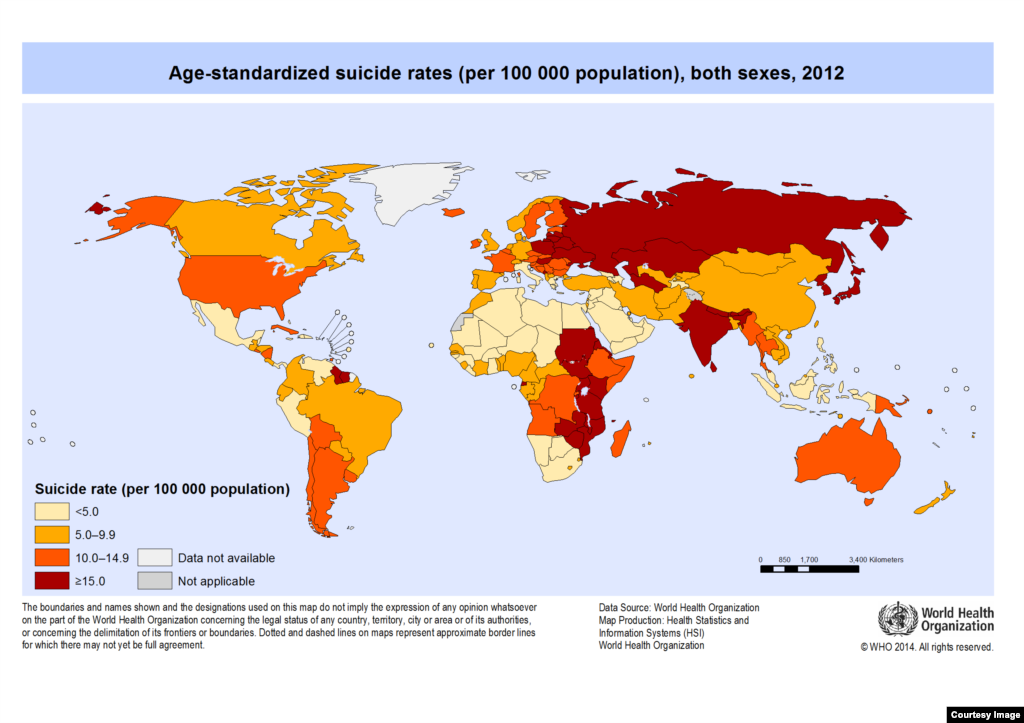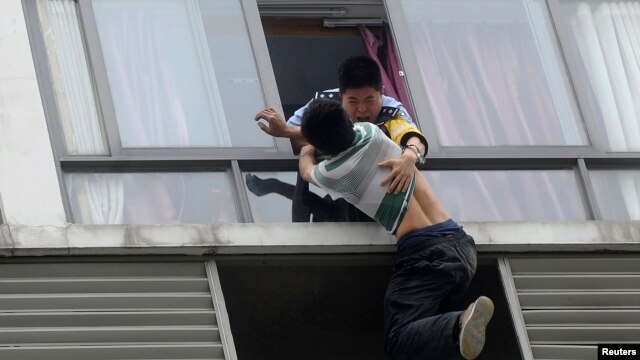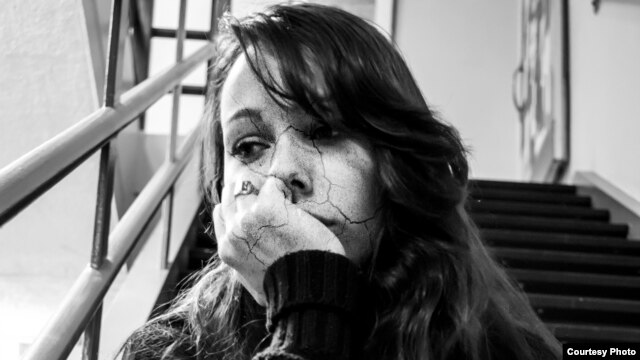
Every year more than 800,000 people die by killing themselves, according to the World Health Organization. The WHO is launching its first global report on suicide prevention. It says more people die from suicide than from conflicts, wars and natural disasters combined. This launch happened in combination with the International Association for Suicide Prevention’s World Suicide Prevention Day on September 10.
Lisa Schlein reports for VOA from the launch of the report in Geneva.
Every 40 seconds a person somewhere in the world commits suicide. This shockingly high number, or statistic, comes from the World Health Organization. Although this statistic is large, the WHO says only a few countries have policies aimed at suicide prevention.
The International Association for Suicide Prevention, or IASP, says suicide in 2012 was the fifth leading cause of death of people between the ages of 30-49.
The association observes World Suicide Prevention Day on September 10. The IASP hopes to raise awareness on the problem of suicide. World Suicide Prevention Day in 2014 is notable because it marks the release of the World Suicide Report by the WHO.
Who Is Committing Suicide?
The World Health Organization calls suicide a major global health problem. It says a common idea is that suicides mostly happen in Western and developed countries. In reality, it says about 75 percent of suicides happen in low- and middle-income countries.

The U.N. health agency finds suicide rates around the world are highest in people over the age of 70. However, The WHO Director of Mental Health and Substance Abuse says young people are also greatly at risk. Dr. Shekhar Saxena notes suicide is the second leading cause of death among those between 15 and 29. And he adds that more men kill themselves than women.
“Overall in the world, more men commit suicide than women. Although in richer countries, in the more developed countries, the proportion is many more men compared to women. In developing countries, the proportion is less skewed. That means … of course, there is still more men, but definitely not as much as in developed countries.”
The WHO says the highest rates of suicide are found in Central and Eastern Europe and in some Asian countries. It says suicide rates in Africa appear to be lower. But, the group warns that there is limited information from the area and it may not be reliable.
What can I do to help?
The International Association for Suicide Prevention says studies have shown that being alone, or in social isolation, can increase the risk of suicide. They say that having strong human connections can protect against suicide. The IASP says simply reaching out to people who have become disconnected from others may be a life-saving act.

Dr. Saxena says there is much more that communities can do to provide support. He says suicide is the final decision for people who are feeling alone, depressed and hopeless. Often, these people reach out for help. Mr. Saxena explains how people can do more to provide support for people who find themselves at the lowest point in life.
“People who eventually commit suicide have, almost in all cases, sought help from someone. It can be a friend. It can be a family member. It can be a health care system. It can be a social care system. It could be a religious organization and very often this request or plea for help was not responded to positively.”
The report says the most common ways of committing suicide globally are poisoning from chemicals intended to kill pests called pesticides, hanging and firearms. Information from a number of European countries, the United States and other developed nations shows limiting access to these means can help prevent suicide.
Media Coverage May Lead To “Copycat” Suicides
Health officials agree that celebrity suicides can cause others to do the same. This is called “copycat behavior.” For example, media around the world covered in great detail the suicide of actor and comedian Robin Williams in August of this year. The Academy of Motion Picture Arts & Sciences sent an image on Twitter showing Disney's Aladdin hugging the genie, voiced in the film by Mr. Williams, with the words "Genie, you're (are) free." Many mental health experts and suicide prevention organizations criticized this message. They claim it does not show the reality of suicide and could lead to copycat suicides.
Alexandra Fleischmann is a scientist in the WHO’s Department of Mental Health and Substance Abuse. She tells VOA there is a link between the way in which suicides are reported in the media and acts that are committed thereafter.
“So, this underlines and emphasizes the role the media play in reporting suicide cases. Suicide should not be glamorized or sensationalized in the media because of the imitation that can follow.”
Decriminalize Attempted Suicide
The World Health Organization is also calling for nations to end the criminalization of suicide.
It says there currently are 25 countries in the world -- in Africa, South America, and Asia -- where both suicide and attempted suicide are considered crimes. It says even people who accidently poison themselves may end up in prison instead of in a health center or hospital that could help them heal.
For more information on World Suicide Prevention Day, please visit www.iasp.info/wspd/
I’m Anna Matteo.
And I’m Christopher Cruise.
Correspondents Lisa Schlein reported the WHO story from Geneva. Anna Matteo wrote and produced it for Learning English.
Words in this Story
suicide – n. the act of killing yourself because you do not want to continue living
statistic – n. a number that represents a piece of information isolated separate from others
depressed – v. having a serious medical condition that causes a person to feel very sad, hopeless, and unimportant : suffering from mental depression
pesticides - n. a chemical that is used to kill animals or insects that damage plants or crops
In the comments section, write a sentence using one of these words and we will provide feedback on your use of vocabulary and grammar.
